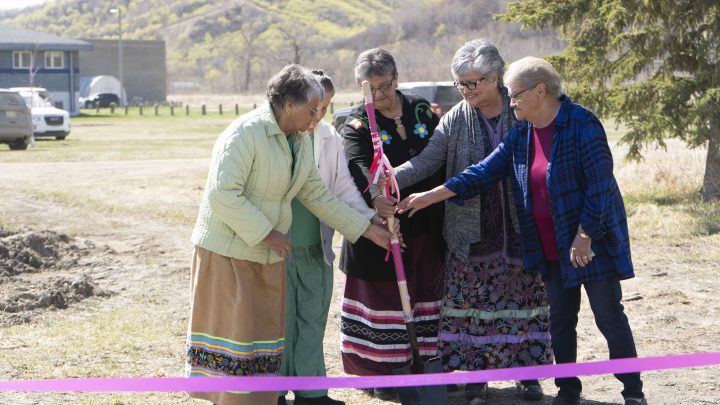Ground broke Thursday for a new residence on Cowessess First Nation for youth girls in long-term care. It will become the new home for ten Cowessess First Nation girls between the ages of 14 and 17 who most need it.

“These youth weren’t born wanting to live in social services under the ministry. They want to be like any other youth in this country who are succeeding,” said Cowessess First Nation Chief Cadmus Delorme.
“Cowessess First Nation wants to play a part in making sure these youth are dreamers, not survivors. When you’re a survivor it’s hard to be a dreamer.”
Cowessess First Nation, which is about 160 kilometres east of Regina, has over 100 children in care. They are spread across provinces of Manitoba, Saskatchewan, Alberta, and B.C. Delorme said not all those who are in care away from the First Nation want to move back, which is why they’re locating those who need it most.
“Some of our youth are in very good homes right now. We just want to be a part of their lives, but there are certain individuals who are couch-surfing. They have trauma in their life – we want to make sure the less fortunate have the best opportunity,” he said.
A newly created role, the community connections outreach worker, will make it their priority to locate all of the Cowessess children in care.
The youth transition home is a promise kept by Chief Charles Delorme and is the first of its kind in southern Saskatchewan. He doesn’t necessarily want it to be the rule- but hopefully, an example.

Get weekly health news
“We’re all on a healing journey, and this is the way Cowessess First Nation wants to go. Any other First Nation that wants to come in and see how we’re doing it, see what we’re doing – we’re open to that. We want to show them if it works. We’re embarking on something new,” he said.
- Carney unveils ‘Buy Canadian’ defence plan, says security can’t be a ‘hostage’
- Rhode Island shooter killed ex-wife, son before bystanders intervened: police
- Canadian immigration officers investigating hundreds identified by extortion task force
- ‘Canada can broker a bridge,’ Carney says on new trading bloc efforts
Delorme said this home is part of the complex journey to reconciliation.
“No one today introduced or created the Indian Act, which imprisoned the minds of many of my people. No one today created residential schools which tried to brainwash the minds of many of my people, but we all inherited the aftermath. This home is one little bit of the solution to reconciliation.”
Cindy Sparvier, the program manager for the new home, said re-connecting these girls to their identity will play a major role in its success.
“We are creating a supportive and nurturing environment that cultivates a sense of belonging within the community with a cultural focus towards self-sufficiency and independence,” Sparvier said.
“The vision is to connect children in care to their communities, believing this bridge will become the community driver to asserting our right to raising in children. The home will aim to break down barriers for our people and bring the community together for generations to come.”
Construction on its basement will begin May 13, and the home, which has already been purchased, will be moved onto the site June 1. A naming ceremony will take place May 31, and the girls will begin to move in August 1.










Comments
Want to discuss? Please read our Commenting Policy first.